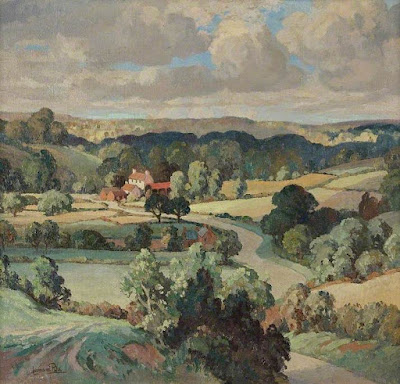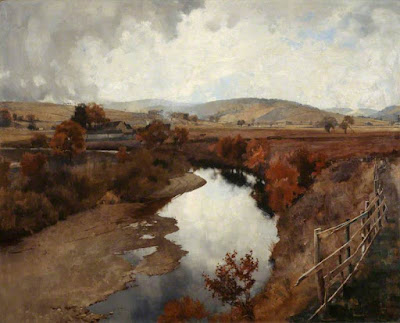Tilling the field;
From the temple among the trees,
The funeral bell tolls.
Buson (1716-1784) (translated by R. H. Blyth), in R. H. Blyth, Haiku, Volume 2: Spring (Hokuseido Press 1950), page 161.
In his four-volume Haiku, R. H. Blyth collects haiku relating to each season into chapters based upon general categories (e.g., "Sky and Elements"; "Fields and Mountains"; "Human Affairs"; "Birds and Beasts"; "Trees and Flowers"). Within each category, the haiku are in turn organized by specific subjects. This description sounds much more rigid than how things play out in practice. Blyth translates hundreds of haiku, but he does not simply provide an anthology. Rather, as I have noted here in the past, Blyth's journey through haiku is accompanied by a wide-ranging and impressionistic (yet learned and thorough) running commentary. The entire World, past and present, is open to examination and contemplation. Therein lies the beauty and charm of Blyth's achievement.
Making the journey in the company of the World's beautiful particulars makes perfect sense. Say, for instance: willows; skylarks; cicadas (semi in Japanese); the River of Heaven (what is called in English "the Milky Way"). ("River of Heaven" is one way of translating the Japanese phrase ama no gawa. Ama means "the heavens" or "the sky"; no is a particle corresponding to "of"; gawa is the euphonic version of the word kawa, which means "river." After coming across ama no gawa years ago, I no longer had need for "the Milky Way.")
On the morning in question, I had decided to return to the haiku collected by Blyth in a section titled "Tilling the Field" in the "Human Affairs" chapter of his Spring volume. I did not go specifically in search of Buson's haiku, but I know it well. One of those poems that is not likely to be forgotten, once it has come into your life. A lovely way to start the day.
Samuel Birch (1869-1955), "Nancledra: Old Cornish Village" (1931)
I am a creature of habit: in addition to reading a poem each morning, I read one in the evening. I have returned to the poetry of Andrew Young of late, having been away from it for too long a time. On the day that I read Buson's "tilling the field" haiku in the morning, I came upon this in the evening:
Spring
I never noticed, till I saw today
How budding birches stand in their green spray
And bracken like a snake from earth upheaves,
How many in this wood are last year's leaves.
Andrew Young, in Edward Lowbury and Alison Young (editors), The Poetical Works of Andrew Young (Secker & Warburg 1985), page 127.
As was the case with Buson's haiku, I hadn't gone in search of "Spring." But, suddenly, there they were: two poems on the same theme (or so it seems to me) arriving on the same day. A matter of mere happenstance. But evidence, perhaps, that there are indeed benefits to growing old. Sometimes (as long as memory remains intact), the poems that have accumulated within us over the years find their way to each other. Where do they reside in the meantime? In the mind, in the heart, in the soul? All of the above.
A small bit of serendipity in the larger scheme of things, one might say. But one might also say that seven lines of poetry (three lines from Japan in the 18th century; four lines from England in the 20th century) may go some way to articulating, with beauty, what it means to spend our short time here in Paradise. "Gifts are still occasionally given us, particularly when we have not asked for them, and I cling to the hope of understanding the link between certain of them and our inner life, their meaning in relation to our most persistent dreams." (Philippe Jaccottet (translated by Mark Treharne), Landscapes with Absent Figures (Delos Press/Menard Press 1997), page 3.)
Gilbert Spencer (1892-1979), "Blackmoor Vale" (1931)
"If man were never to fade away like the dews of Adashino, never to vanish like the smoke over Toribeyama, but lingered on forever in the world, how things would lose their power to move us! The most precious thing in life is its uncertainty. Consider living creatures -- none lives so long as man. The May fly waits not for the evening, the summer cicada knows neither spring nor autumn. What a wonderfully unhurried feeling it is to live even a single year in perfect serenity! If that is not enough for you, you might live a thousand years and still feel it was but a single night's dream."
Kenkō (1283-1350) Tsurezuregusa (Chapter 7), in Donald Keene (translator), Essays in Idleness: The Tsurezuregusa of Kenkō (Columbia University Press 1967), pages 7-8. Keene provides this note to "Adashino": "Adashino was the name of a graveyard, apparently situated northwest of Kyoto. The word adashi (impermanence), contained in the place name, accounted for the frequent use of Adashino in poetry as a symbol of impermanence. The dew is also often used with that meaning." Ibid, page 8. Keene also provides a note to "Toribeyama": "Toribeyama is still the chief graveyard of Kyoto. Mention of smoke suggests that bodies were cremated there." Ibid, page 8.
I have certainly made quite a leap based upon two short poems, haven't I? But they do go together well. Daily consideration of our evanescence is always a good thing. Who knows? It may lead to equanimity and gratitude. Dread or melancholy will get us nowhere.
In any case, as I have noted here in the past, when it comes to Beauty, one thing leads to another. Hence, after encountering Buson's haiku, I followed its path, coming first to this:
Even on a small island,
A man tilling the field,
A lark singing above it.
Issa (1763-1828) (translated by R. H. Blyth), in Blyth, Haiku, Volume 2: Spring, page 199.
Followed by this (another haiku by Buson):
Tilling the field:
The cloud that never moved
Is gone.
Buson (translated by R. H. Blyth), Ibid, page 167.
And, finally, Buson again:
Tilling the field:
The man who asked the way
Has disappeared.
Buson (translated by R. H. Blyth), Ibid, page 165.
Long-time (and much-appreciated!) readers of this blog may recall my fundamental poetic principle: Explanation and explication are the death of poetry. Thus, no doubt wrenching his words completely out of context, I turn to Ludwig Wittgenstein: "What we cannot speak about we must pass over in silence." (Ludwig Wittgenstein, Proposition 7, Tractatus Logico-Philosophicus (1921) (translated by David Pears and Brian McGuiness).)
Roger Fry (1866-1934), "Village in the Valley" (1926)
"Remember what an Atom your Person stands for in respect of the Universe, what a Minute of unmeasurable Time comes to your share, and what a small Concern you are in the Empire of Fate!" (Marcus Aurelius (translated by Jeremy Collier), Meditations, Book V, Section 24, in Jeremy Collier (1650-1726), The Emperor Marcus Antoninus: His Conversation with Himself (1701), page 78.) "The Empire of Fate" is a wonderful touch by Collier. Even more piquant is this: "Manage all your Actions and Thoughts in such a Manner as if you were just going to step into the Grave." (Marcus Aurelius (translated by Jeremy Collier), Meditations, Book II, Section 11, Ibid, page 21.)
[A side-note: Collier's translation of the Meditations has been criticized for its lack of strict fidelity to the original text. However, his late 17th century/early 18th century prose style is marvelous. In a review of George Long's now-standard 19th century translation of the Meditations, Matthew Arnold chides Long for being "a great deal too hard" on Collier. (Matthew Arnold, "Marcus Aurelius," in Essays in Criticism (Macmillan 1865), page 275.) Arnold contends that Collier's translation "deserves respect for its genuine spirit and vigour, the spirit and vigour of the age of Dryden. Jeremy Collier too, like Mr. Long, regarded in Marcus Aurelius the living moralist, and not the dead classic; and his warmth of feeling gave to his style an impetuosity and rhythm which from Mr. Long's style (I do not blame it on that account) are absent." (Ibid, pages 275-276.) I usually rely upon the 1742 translation by Francis Hutcheson and James Moor (a product of the Scottish Enlightenment). However, I agree with Arnold's view, and often turn to Collier's version in order to enjoy (to use Arnold's phrase) "its genuine spirit and vigour."]
Just as one thing led to another when it came to Buson's "tilling the field" haiku, Andrew Young's "Spring" led me to several other poems by Young. First, I remembered this:
Walking in Beech Leaves
I tread on many autumns here
But with no pride,
For at the leaf-fall of each year
I also died.
This is last autumn, crisp and brown,
That my knees feel;
But through how many years sinks down
My sullen heel.
Andrew Young, in Edward Lowbury and Alison Young (editors), The Poetical Works of Andrew Young, page 53.
But, beyond the lingering dead leaves of vanished years, I thought next of this:
The Nest
Four blue stones in this thrush's nest
I leave, content to make the best
Of turquoise, lapis lazuli
Or for that matter of the whole blue sky.
Andrew Young, Ibid, page 54.
And, as always, I soon found my way to this, my favorite among Young's poems:
A Dead Mole
Strong-shouldered mole,
That so much lived below the ground,
Dug, fought and loved, hunted and fed,
For you to raise a mound
Was as for us to make a hole;
What wonder now that being dead
Your body lies here stout and square
Buried within the blue vault of the air?
Andrew Young, Ibid, page 63.
Yes, when it comes to Beauty, one thing leads to another. I think of something written by Kenkō: "A certain hermit once said, 'There is one thing that even I, who have no worldly entanglements, would be sorry to give up, the beauty of the sky.' I can understand why he should have felt that way." (Kenkō, Tsurezuregusa, Chapter 20, in Donald Keene (translator), Essays in Idleness: The Tsurezuregusa of Kenkō, page 22.) The sky: blue, grey, mottled with white clouds, or otherwise. "Manage all your Actions and Thoughts in such a Manner as if you were just going to step into the Grave." "The most precious thing in life is its uncertainty."
William Birch (1895-1968)
"Morning in June, the Vale of Dedham, Essex"



























